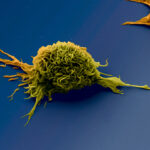Link to Pubmed [PMID] – 38118422
Link to DOI – 10.1016/j.xcrm.2023.101256
Cell Rep Med 2023 Dec; 4(12): 101256
FLT3-L-dependent classical dendritic cells (cDCs) recruit anti-tumor and tumor-protecting lymphocytes. We evaluate cancer growth in mice with low, normal, or high levels of cDCs. Paradoxically, both low or high numbers of cDCs improve survival in mice with melanoma. In low cDC context, tumors are restrained by the adaptive immune system through influx of effector T cells and depletion of Tregs and NK cells. High cDC numbers favor the innate anti-tumor response, with massive recruitment of activated NK cells, despite high Treg infiltration. Anti CTLA-4 but not anti PD-1 therapy synergizes with FLT3-L therapy in the cDCHi but not in the cDCLo context. A combination of cDC boost and Treg depletion dramatically improves survival of tumor-bearing mice. Transcriptomic data confirm the paradoxical effect of cDC levels on survival in several human tumor types. cDCHi-TregLo state in such patients predicts best survival. Modulating cDC numbers via FLT3 signaling may have therapeutic potential in human cancer.

